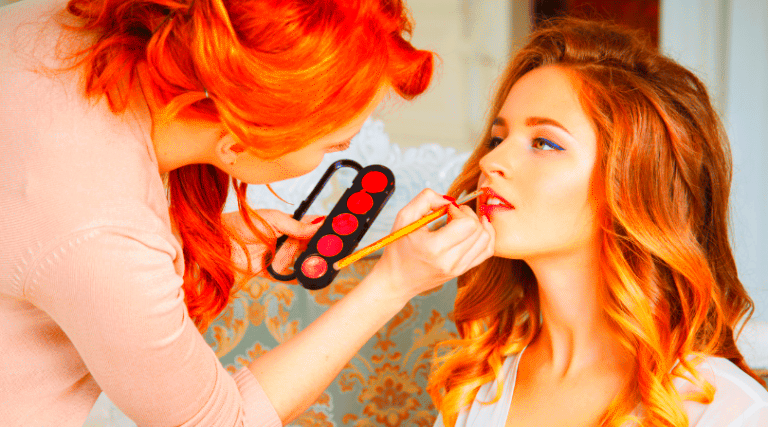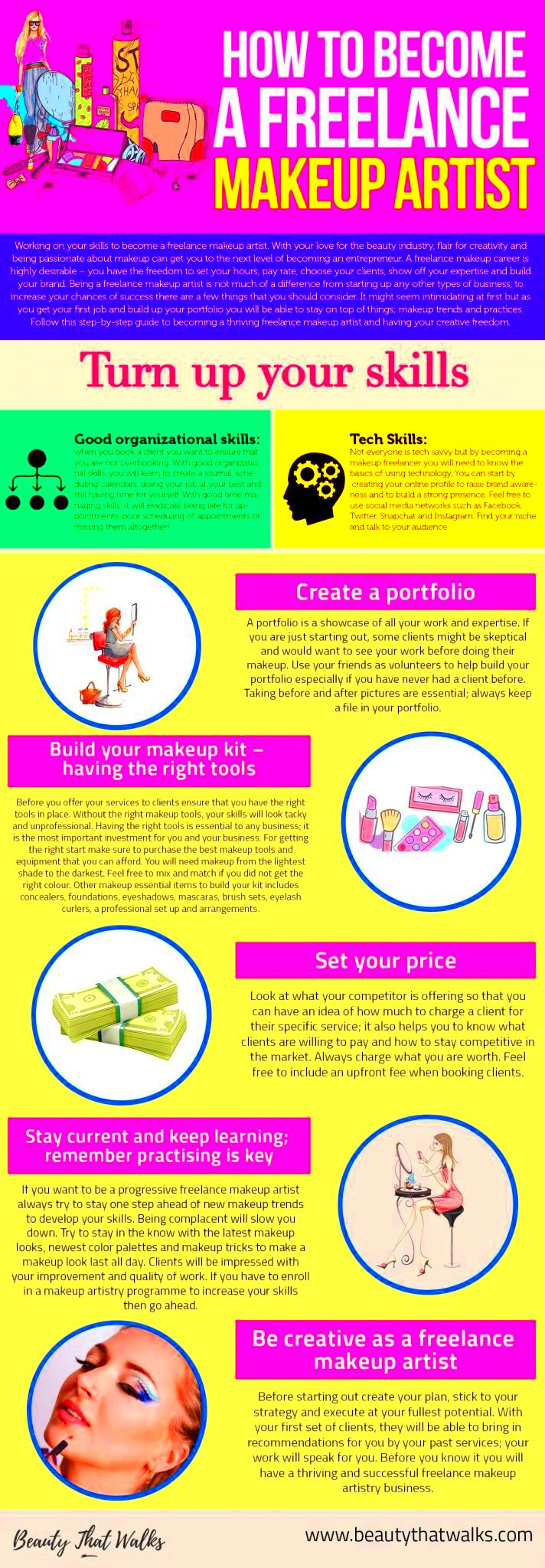Criteria for getting into the freelance makeup artistry industry vary and they differ for every person who has ever done it but it is always true that you must be passionate about make-up in the first place. One main benefit of being a freelance makeup artist is your ability to express yourself and make people feel good about themselves by changing their looks with cosmetics. Make-up artistry provides different areas of interest like special events, fashion or films among others thus making it wide open for everyone in terms of opportunities. As a freelance artist you have the choice to pick clients, decide on charges and engage in projects that stimulate your interest. This article highlights critical information on how to begin your career as a freelance makeup artist.
Understanding the Role of a Makeup Artist

To beautify one’s natural features for different events, the skills and expertise of a qualified make-up artist are important. Following are some of the major responsibilities of such experts:
- Consultation: Meeting with clients to understand their needs and preferences.
- Makeup Application: Applying makeup professionally for events like weddings, photoshoots, or theater performances.
- Skin Care Advice: Providing recommendations for skin care products that complement makeup looks.
- Keeping Up with Trends: Staying updated with the latest makeup trends and techniques.
The flexibility and creativity that the makeup artists possess are paramount because they work in various environments including salons and spas, on runway shows or for movies. Each assignment has its distinct set of difficulties and possibilities.
Also Read This: How to Sell on Fiverr with No Experience
Essential Skills for Makeup Artists

To do well as an independent make-up professional, you require a combination of creative ability and applicable know-how. Below are some important abilities to hone:
- Artistic Talent: A good eye for color and detail is crucial. Practice different makeup techniques to refine your skills.
- Communication: Being able to effectively communicate with clients to understand their vision is vital.
- Time Management: Managing your time efficiently helps ensure you meet deadlines, especially on busy event days.
- Knowledge of Products: Familiarize yourself with various makeup brands and products to make informed recommendations.
- Adaptability: Each client may have different needs, so being flexible and willing to adapt is important.
To conclude, if you want to be a successful freelance makeup artist, then you must learn these skills. This will ensure that you remain updated in your field and competitive through continuous learning and practice.
Also Read This: How Many Gigs Can I Have on Fiverr?
Building Your Makeup Artist Portfolio
As a makeup artist, your portfolio is like the business card. It shows your talents, inventiveness and adaptability to prospective employers. In a competitive environment having a solid portfolio sets you apart from others. The first step is obtaining photographs with great quality of what you have done before. Try to embrace all kinds of styles and appearances according to prove your flexibility.
These are some of the awesome portfolio ideas:
- Professional Photos: Invest in a professional photographer or work with models to capture your makeup looks in the best light.
- Diverse Looks: Include a mix of bridal, editorial, theatrical, and everyday looks to show your versatility.
- Before and After Shots: These images highlight your skills in transforming a client’s appearance.
- Online Presence: Create a digital portfolio on platforms like Instagram, Facebook, or a personal website to reach a wider audience.
Never forget that what you have in your portfolio represents who you are, so do not forget to put the new stuff there. Continually adding different pictures should help get more customers and keep the portfolio interesting.
Also Read This: How to Attach a Questionnaire File in Fiverr
Finding Your First Clients as a Makeup Artist
Finding initial customers might be intimidating, but there are multiple ways to launch a freelance career. Here’s how you could start gaining clients:
- Networking: Attend local events, bridal fairs, or beauty expos to meet potential clients and other professionals in the industry.
- Offer Your Services: Consider providing your makeup services for free or at a discounted rate to friends, family, or local events. This can help you gain experience and build your portfolio.
- Leverage Social Media: Use platforms like Instagram and Facebook to showcase your work. Engage with followers by sharing tips, tutorials, and behind-the-scenes content.
- Word of Mouth: Ask satisfied clients for referrals and reviews. Positive feedback can significantly influence potential clients’ decisions.
It requires time and effort to find clients; thus, being consistent is important while enhancing your abilities. You have more chances of being reached if you expose yourself frequently.
Also Read This: How to Cancel Your Fiverr Seller Plus Subscription
Promoting Yourself in the Makeup Industry
Gaining publicity through efficient advertising is vital in making yourself known as a productive independent make-up artist. These are some techniques that can help you become visible:
- Create a Strong Brand: Develop a unique brand identity, including a memorable name, logo, and consistent visual style across all your platforms.
- Utilize Social Media: Regularly post your work, engage with followers, and use relevant hashtags to reach a larger audience. Platforms like Instagram and TikTok are particularly effective for visual artists.
- Collaborate with Others: Partner with photographers, hairstylists, and influencers to create content. Collaborations can help you reach new audiences and create amazing portfolio pieces.
- Join Online Communities: Participate in forums, Facebook groups, or other online communities related to makeup artistry. Sharing your expertise can help you build a reputation and connect with potential clients.
- Offer Promotions: Consider running special promotions or discounts for new clients or during peak seasons like wedding season.
Engaging and promoting oneself actively will, over time, make one more credible in the beauty world thus attracting a lot of clients.
Also Read This: How to Change Your Name on Fiverr
Tips for Success as a Freelance Makeup Artist
To become successful in freelancing as a make-up artist you need certain aspects including hard work, professionalism and some business sense. Here are some tips that can guide this career;
- Stay Current with Trends: The beauty industry evolves rapidly. Follow beauty blogs, attend workshops, and watch tutorials to stay updated on the latest trends and techniques.
- Invest in Quality Tools: High-quality makeup brushes and products can make a significant difference in your work. Invest in good tools to ensure the best results for your clients.
- Practice Regularly: The more you practice, the better you’ll get. Experiment with different looks and techniques on yourself or friends to refine your skills.
- Maintain Professionalism: Always communicate clearly with clients, arrive on time, and be respectful of their preferences. Professionalism goes a long way in building a good reputation.
- Set Clear Boundaries: As a freelancer, it's important to define your working hours, payment terms, and cancellation policies upfront to avoid misunderstandings.
These tips will help you start an independent make-up career and create good connections with your clients so that you can have a successful job.
Also Read This: How Do I Accept an Order on Fiverr?
Frequently Asked Questions
So you’ve decided to kick off a career as a freelance make-up artist; any questions at all? Well, check out these answers for some frequently asked questions:
- Do I need formal training? While formal education can be beneficial, many successful makeup artists are self-taught. Online courses and tutorials can also be helpful.
- How much should I charge? Pricing varies widely based on experience, location, and the services offered. Research what others in your area charge to help set your rates.
- What should I include in my kit? Your makeup kit should include a variety of foundation shades, eyeshadows, lipsticks, brushes, and skincare products to cater to different clients.
- How do I handle difficult clients? Always remain calm and professional. Listen to their concerns and try to find a solution that satisfies both parties.
Should you possess additional inquiries, do not think twice to contact with other practitioners or look for direction from guides in the business.
Conclusion and Final Thoughts
As an independent cosmetic artist, it is a fulfilling path flooded with imagination and the capability to express oneself freely. You can make it if you have commitment, ongoing education and appropriate plans for one’s business. Stay focused on enhancing your abilities, constructing a portfolio and marketing yourself efficiently. Your love for makeup will help you win over customers and generate prospects.




